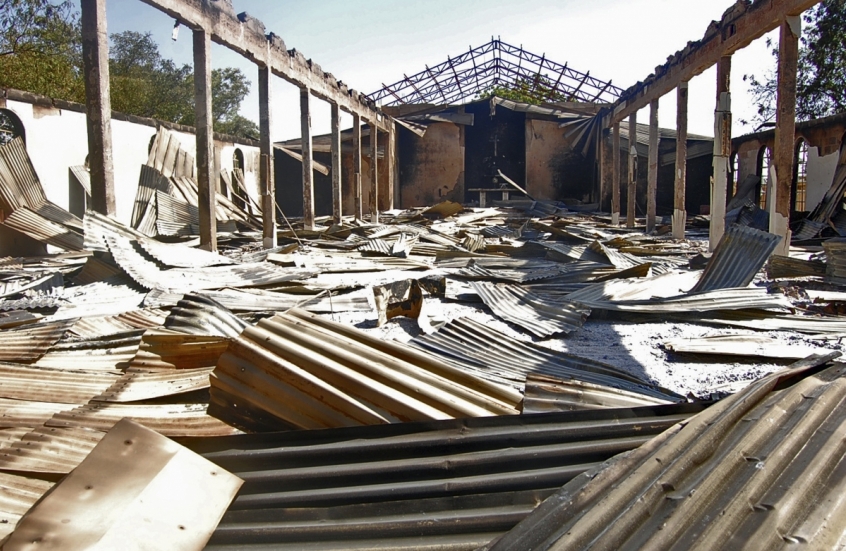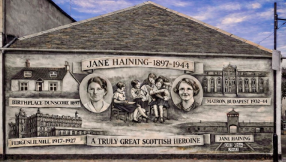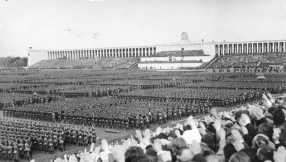
Statistically, the worst place in the world to be a Christian is in North Korea. It has topped persecution charity Open Doors' annual World Watch List of countries where Christians face the harshest treatment for the past 14 years. Under dictator Kim Jong-Un, the government maintains absolute control through the systematic repression of its citizens. More than 100,000 Christians are thought to be in hard labour camps, while tens of thousands of citizens have defected to countries such as neighbouring South Korea, China, Mongolia and Russia. A report released this week warned that documented incidents against Christians include "being hung on a cross over a fire, crushed under a steamroller, herded off bridges and trampled underfoot".
However, surprisingly, Eddie Lyle – president of Open Doors UK and Ireland – says North Korea is not actually the most difficult country for Christians to live out their faith. He gives that title to Nigeria, where he says the Church "is facing its Gethsemane".
"For the most part it stands alone and misunderstood. It has endured years of destruction, great human loss, and its people scattered. It's time for the Church around the world to hear not only their cries, but their screams for help, and for the support of the family of God around the world," he tells Christian Today.
Lyle was in Northern Nigeria in May this year, visiting Church leaders and pastors who have experienced extreme violence at the hands of Boko Haram – an Islamist group that has waged terror in Nigeria's northern states since 2009.
In April 2014, more than 200 Christian girls were abducted from their school in Chibok, Borno state, by Boko Haram militants. A few have managed to escape but 218 are still missing, believed to remain in captivity. A video released by the terrorist group in August showed dozens of the schoolgirls, one of whom begged the Nigerian government to free detained Boko Haram members in a prisoner swap.
The girls' capture was part of a wider Boko Haram campaign against education in Nigeria – its name means "Western (or non-Islamic) education is forbidden". More than 910 schools have been targeted, at least 611 teachers deliberately killed and another 1,900 forced to flee.
The fighting has sparked a largely unreported refugee crisis with an estimated 2.2 million people, including 1.4 million children, displaced. Only around 10 per cent are in government-recognised refugee camps where there is some schooling. The other 90 per cent are living with friends and family members with little or no access to education.
Christians are among the groups to have fared the worst. Last month, Boko Haram's new leader Abu Musab al-Barnawi vowed to eradicate Christianity in Nigeria. Militants will blow up "every church that we are able to reach... killing all of those who we find from the citizens of the cross", he said.
Lyle met the families of some of the missing Chibok schoolgirls. "I saw a level of devastation in the eyes of those mothers and fathers that I have never seen before – an ongoing torture," he says. "To witness the erosion of life that has been ebbed away from those people, with no hope for the future, I found that profoundly harrowing."
One father, Jonah, asked Lyle how to stop his wife from screaming in the night. "What would Jesus say to her, Eddie?" he asked.
"The thing that I always come back to is that verse of Scripture that says when one part of the body hurts, the whole body hurts," Lyle says. "I held him in my arms, I prayed with him and promised to be his voice."
The most dangerous prayer you can pray
In 1970, aged 17, Lyle stood at the altar in a tiny church in Northern Ireland, opened his hands, and said to God three simple, yet life-changing, words: "Please use me".
"That's the most dangerous prayer you can ever pray," he says.
Now 64, Lyle has for two decades worked for Open Doors. He spends his time primarily travelling around the world meeting Christians persecuted for their faith and urging the wider Church body to begin speaking up for the oppressed.
"I've seen the most amazing things God is doing and the greatest sorrows of his people," he says. "I've seen the nobility of a life that is lived to the glory of God going through great hardship, and I've seen God take that awful ugliness and brokenness and transform it into something astonishing."
'There is only one Church'
Lyle is adamant that there is a great theological misnomer plaguing the global Church – a belief "that there is a persecuted Church and a free Church. That is totally wrong," Lyle says.
"There is only one Church."
He's clear that persecuted Christians have a lot to teach the rest of the Church body about prayer and holding fast to the Bible, "but there's a reciprocity required there whereby they need us to pray, they need us to be their voice... to speak up for those who don't have the most basic of human rights which is to worship the God of their heart. Whether they are Christians or not, whether they have faith or no faith, to be able to be who they are without fear of repression," he says.
"This is about family business. This is not a philanthropic interest, this is about a biblical imperative which says when one part of the body hurts, the whole body hurts. Or in Hebrews, remember those who are in prison as if you were in prison, remember those who suffer as if you were suffering.
"This is core business; this is family business. This is not a worthy cause... our Father is calling us to be united and to stand together, and to face this darkness and to shine for Christ."
It's this mandate that has led Lyle all over the world. In Nigeria, he met one pastor who inherited a church and built it to more than 500 people. Boko Haram militants killed every single member apart from the pastor, his wife and the caretaker. "I came here to bring life, not to bury the dead," he told Lyle.
"We can't sit back and watch this happen," Lyle says. "The number of churches which have been burnt down, people have been destroyed, their livelihoods have been destroyed. North-eastern Nigeria needs to be rebuilt."
He has numerous similar harrowing tales from across the globe. He shares a letter sent by a Christian woman in Syria, whose eldest son was killed by three young Muslim boys. "They told him to 'renounce Jesus and proclaim Mohammed or we'll kill you'," the mother wrote.
"I'm ashamed to say that if I'd been there I think I'd have pleaded with him to say whatever they wanted, to save his skin. But I'm so proud that he refused. Three times. Three times they shot him."
Her youngest son now refuses to sleep without a gun, and has pledged to avenge his brother's death. "I'm not sure now whether I've lost one son or two," his mother says.
In another letter, a Syrian church leader described the agony of deciding to remain in Syria, despite the violence. "As a mother and a wife I want to leave, but as a Christian I want to stay," she wrote. "Every time my husband and I pray, God gives us a burden on our heart: stay in Syria. He has things for us to do here."
She described explaining to her daughters the reality of what that decision may mean. "I took them outside the front door and got them to look up and down the street. I said, one day a bomb may hit, or someone may come down this street and put a sword to our necks. Don't say what they want you to say. They will try to persuade you to become a Muslim. Don't say anything about Islam. Just say that you forgive them and tell them Jesus loves them. You might be in pain for an hour or so, there will be blood, but then you will be with Jesus in heaven."
Lyle has hundreds of stories like these, but he says there's "a danger in deifying" persecuted Christians.
"They don't wish to be elevated to the rank of 'super Christian'. They just want to be seen to be a Jesus follower. When you're prepared to sacrifice your children, your husband and your life for the cause of Christ, that's saying something not only about who you are, your identity, your culture, your beliefs and the values you live by, but also the one you seek to serve," he says.
"The most devout Christians I've met are those who have sacrificed so much for the sake of the gospel because they have met with Jesus."
Hope for the Church
In the midst of the senseless violence and horrors of war, Lyle does see hope for the Church in the Middle East. Where before there were barriers between people of different cultures and faiths, now these are breaking down. Churches are full of Orthodox Christians, Pentecostals, Christians from a Muslim background, Syriacs, and Armenians. He tells the story of one pastor who sent text messages to his entire congregation asking them not to come to church one day because there were so many Muslims that there wasn't room for anyone else.
One Syrian refugee now living in Lebanon told Lyle earlier this year: "I became a Christian because your God answers prayer, and I've never seen prayer answered."
A colleague was told by a Muslim in besieged Aleppo: "We have Allah in Heaven, but we have you Christians on Earth".
"A new Church is emerging, the like of which they have not seen before," Lyle says. "The Church is at its most powerful when it's on its back foot. I'm not a prophet, but I see some seed of a different reality of Church emerging out of the rubble and chaos."
The Syrian church leader who has chosen to stay and fight for her country is equally hopeful. In her letter, she writes: "God will bless Syria, I know this for sure. He is already blessing us. Every time we go to church, the church is full.
"People come together in times of despair. But we also see new faces every time. People who weren't Christians before the war. They say, 'We've lost everything – our house, our job, our family – but we gained the most important thing: the knowledge that Jesus is our saviour.'"













